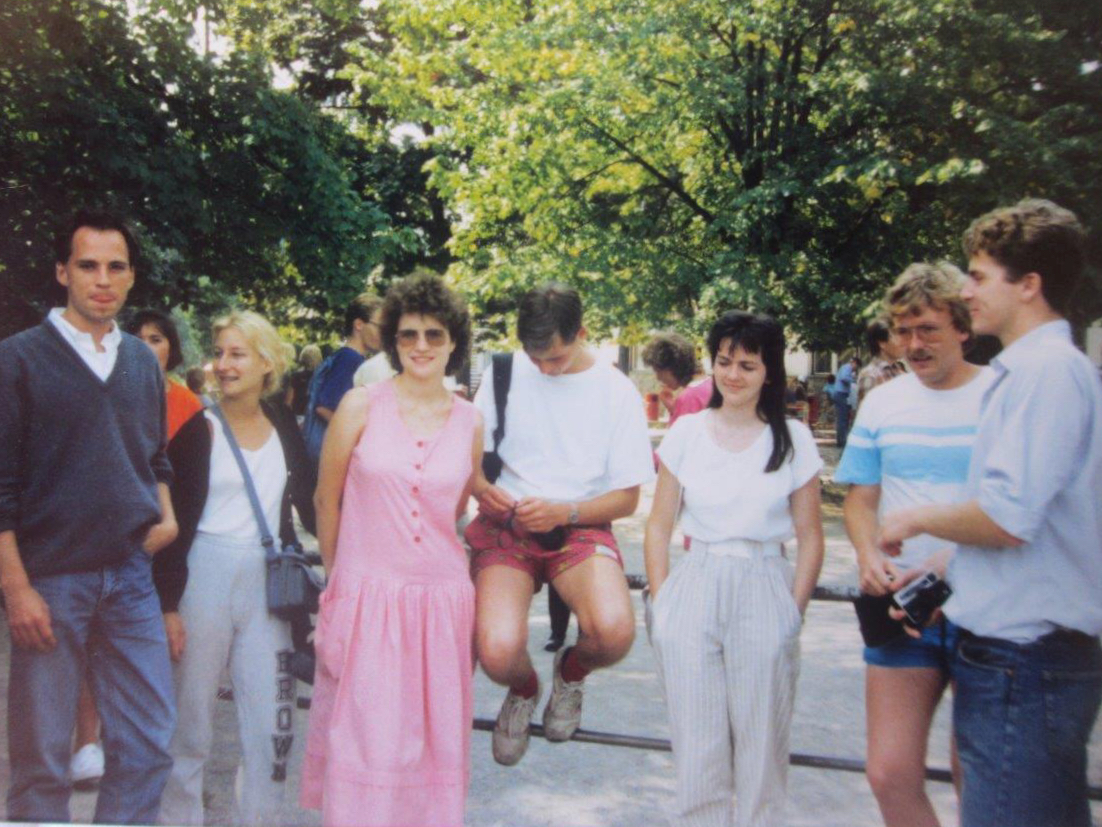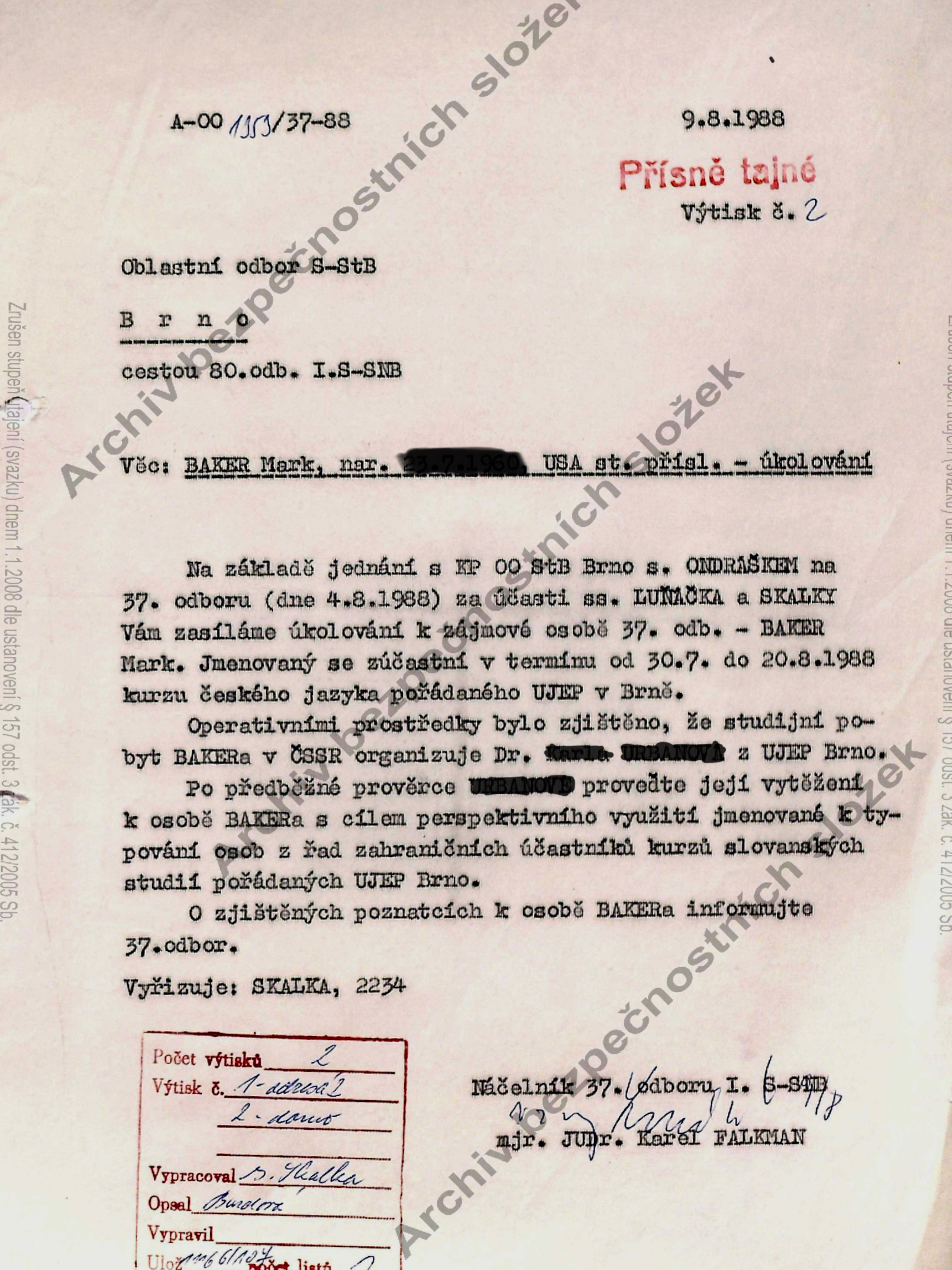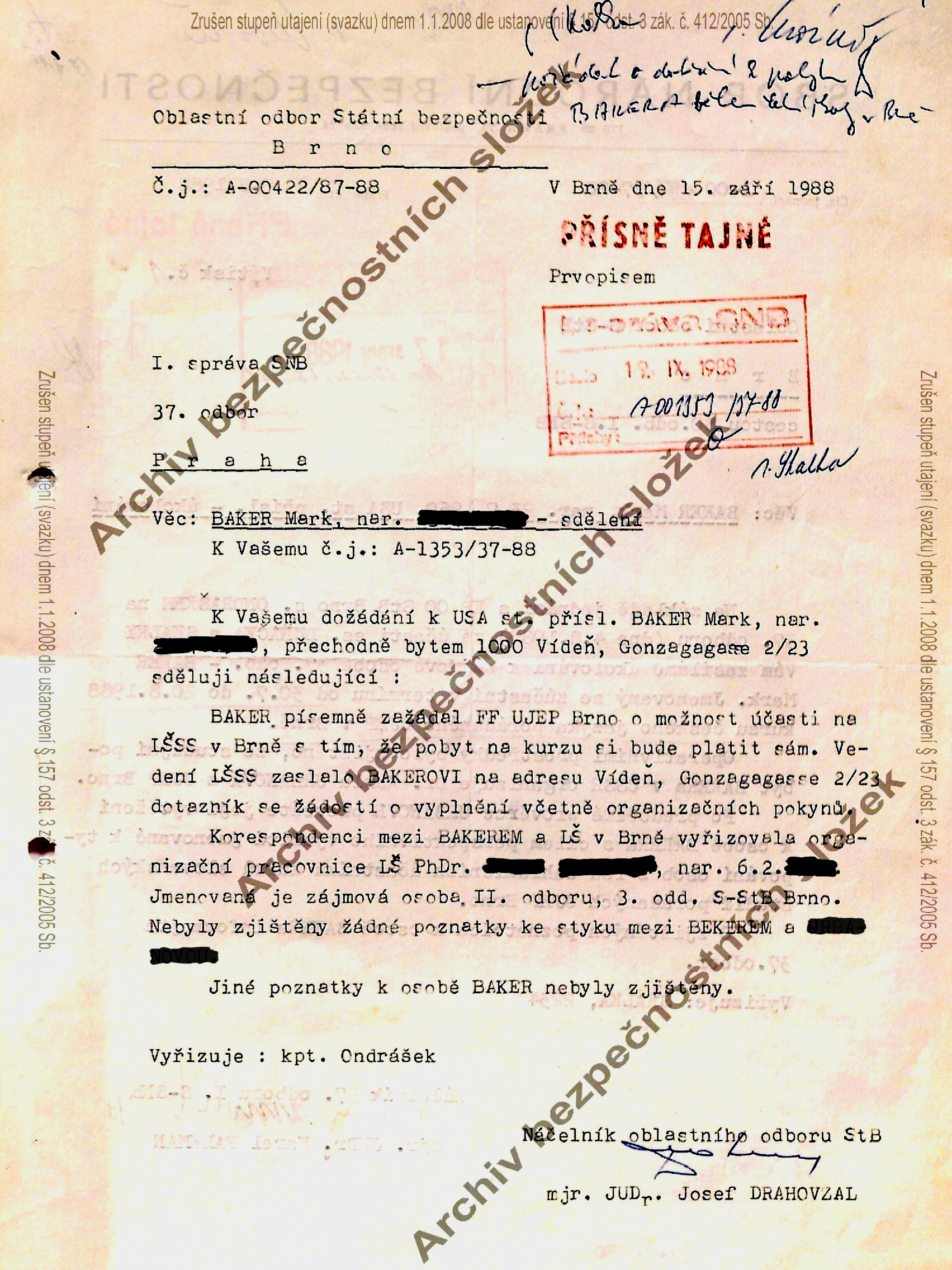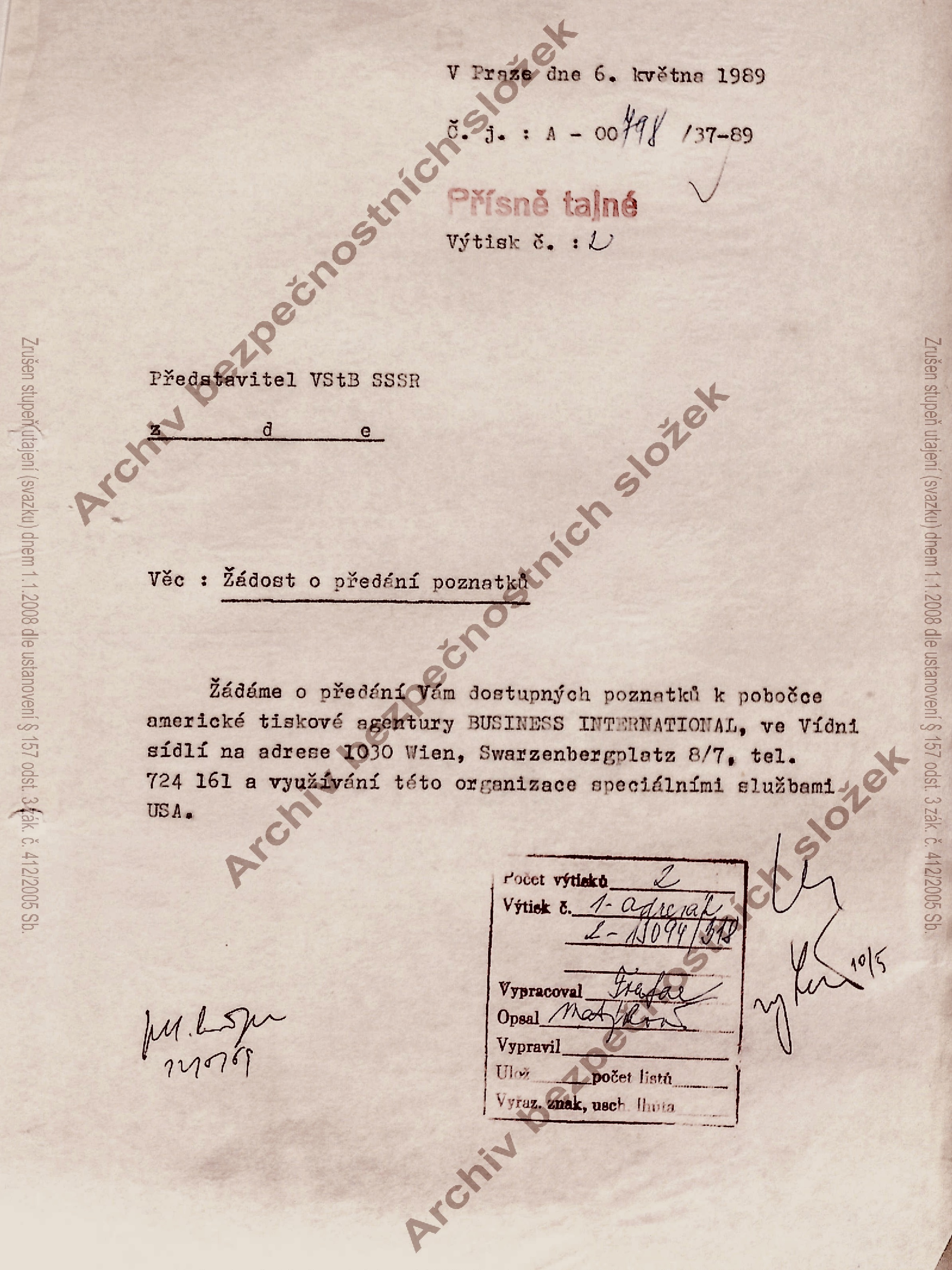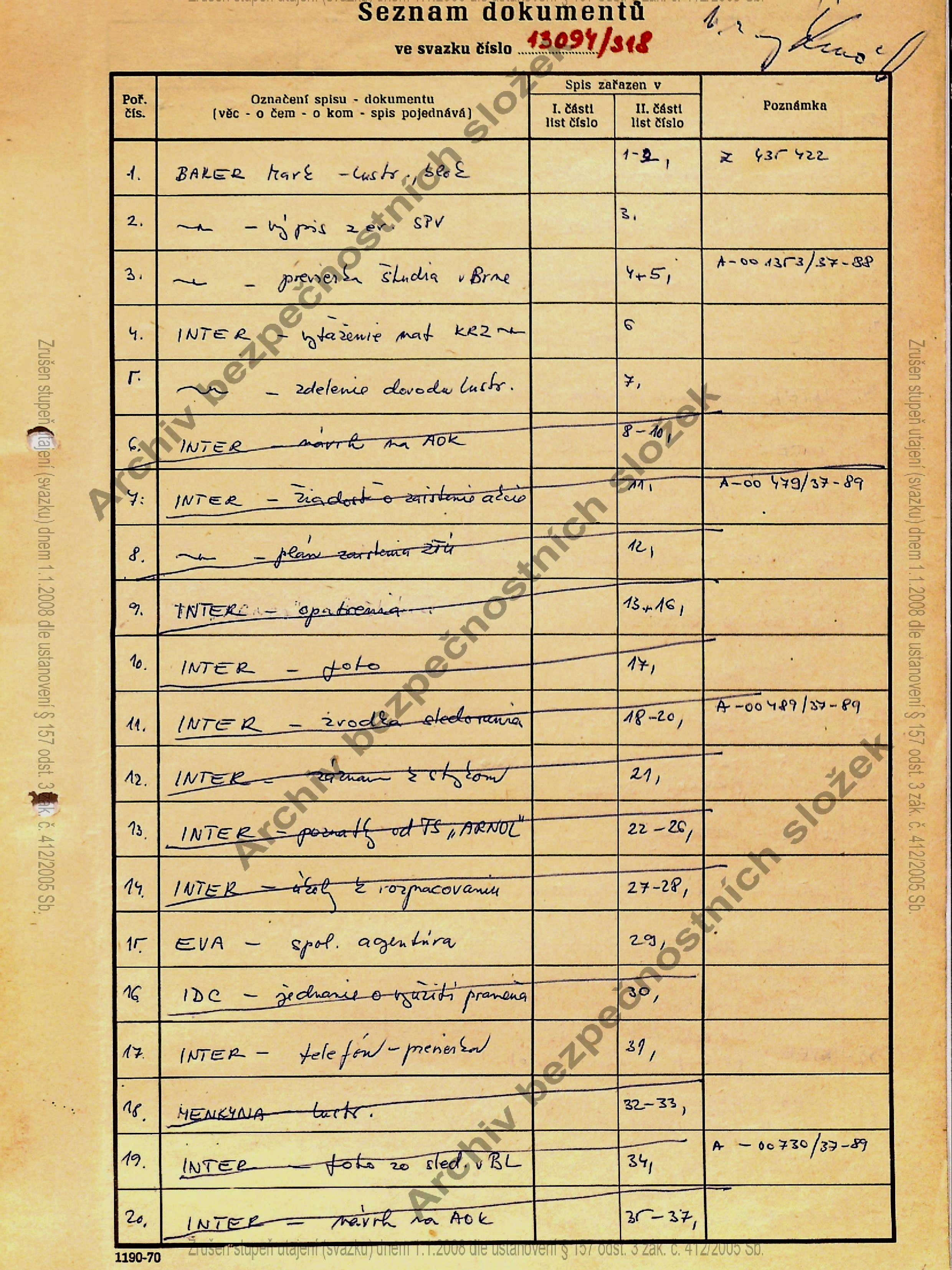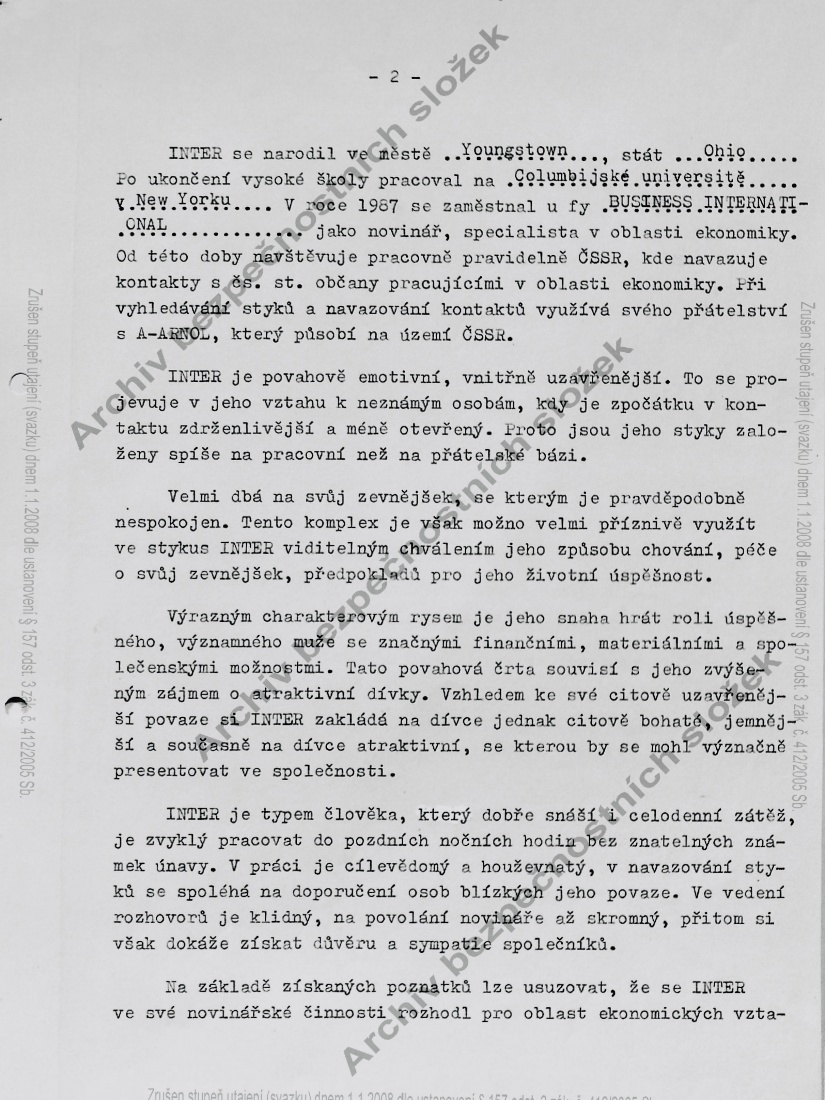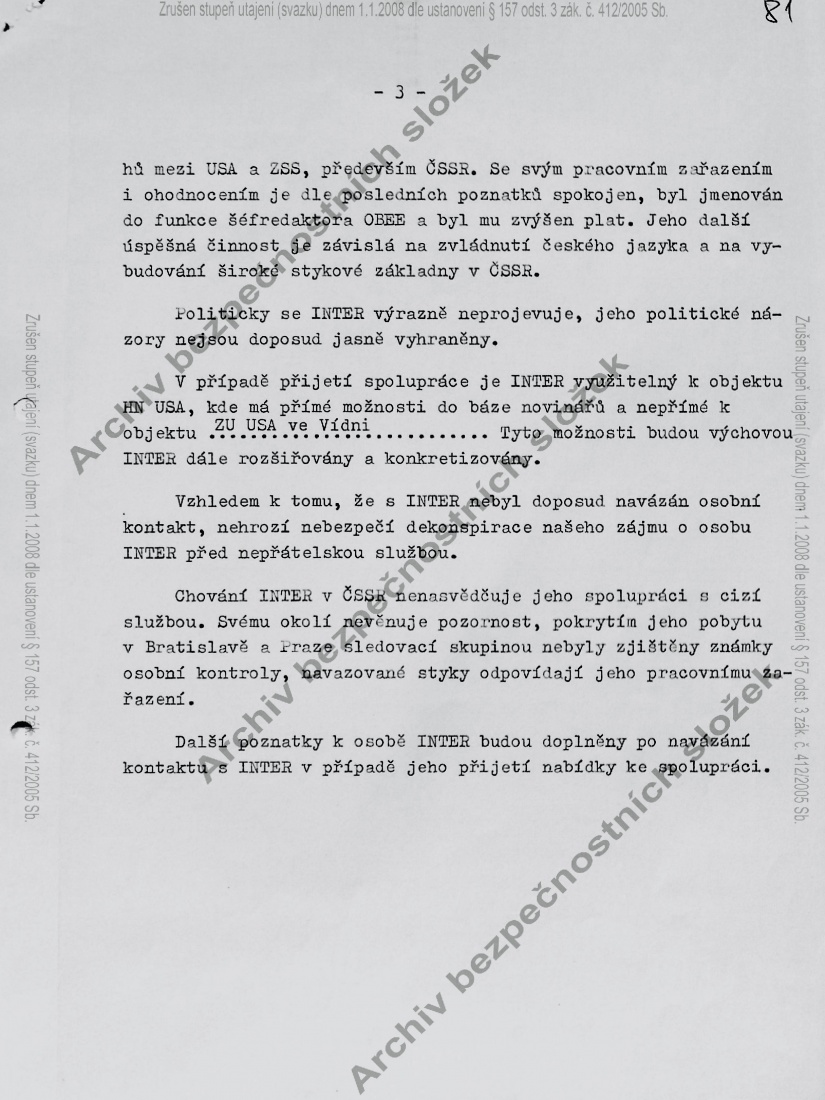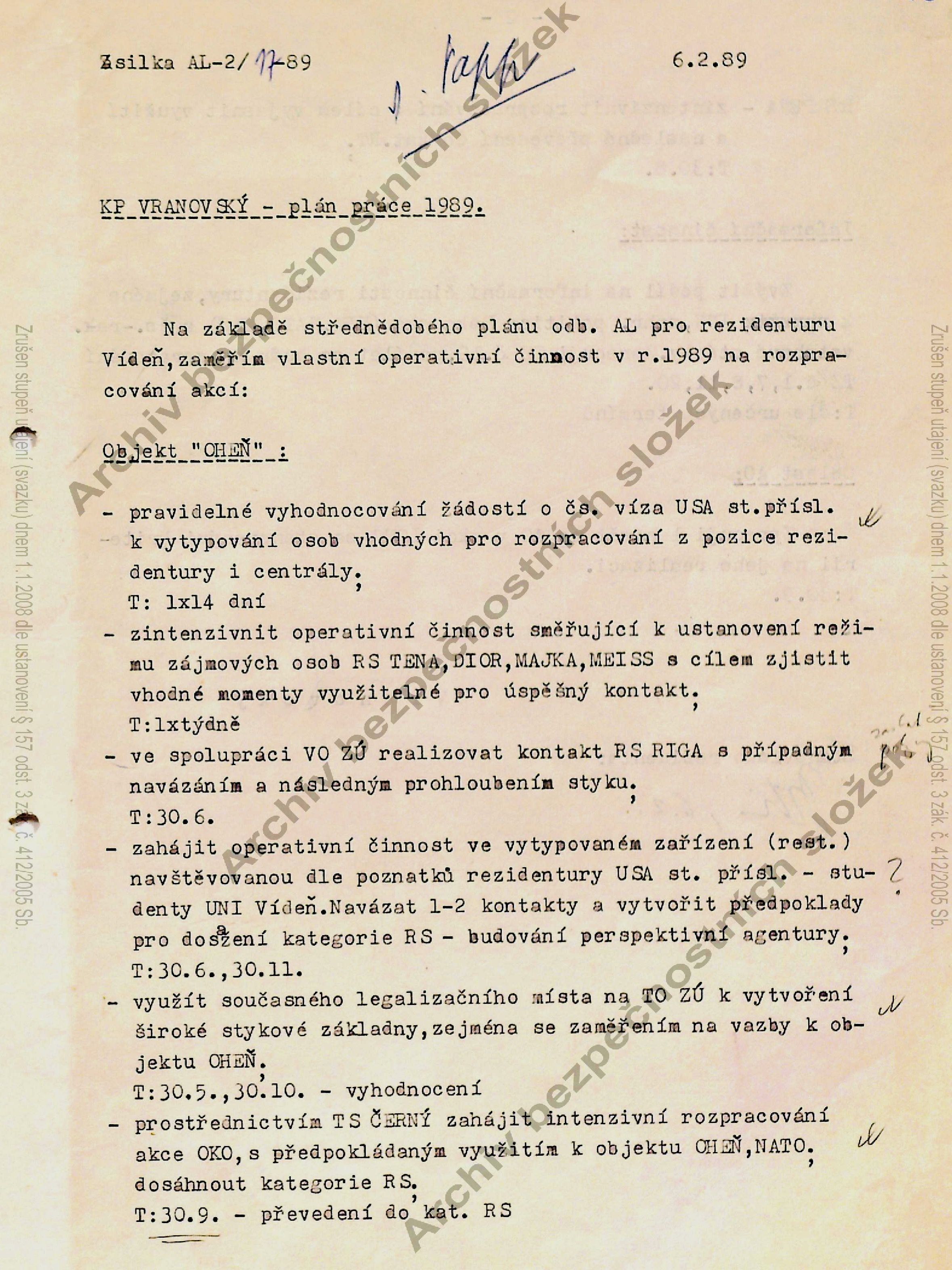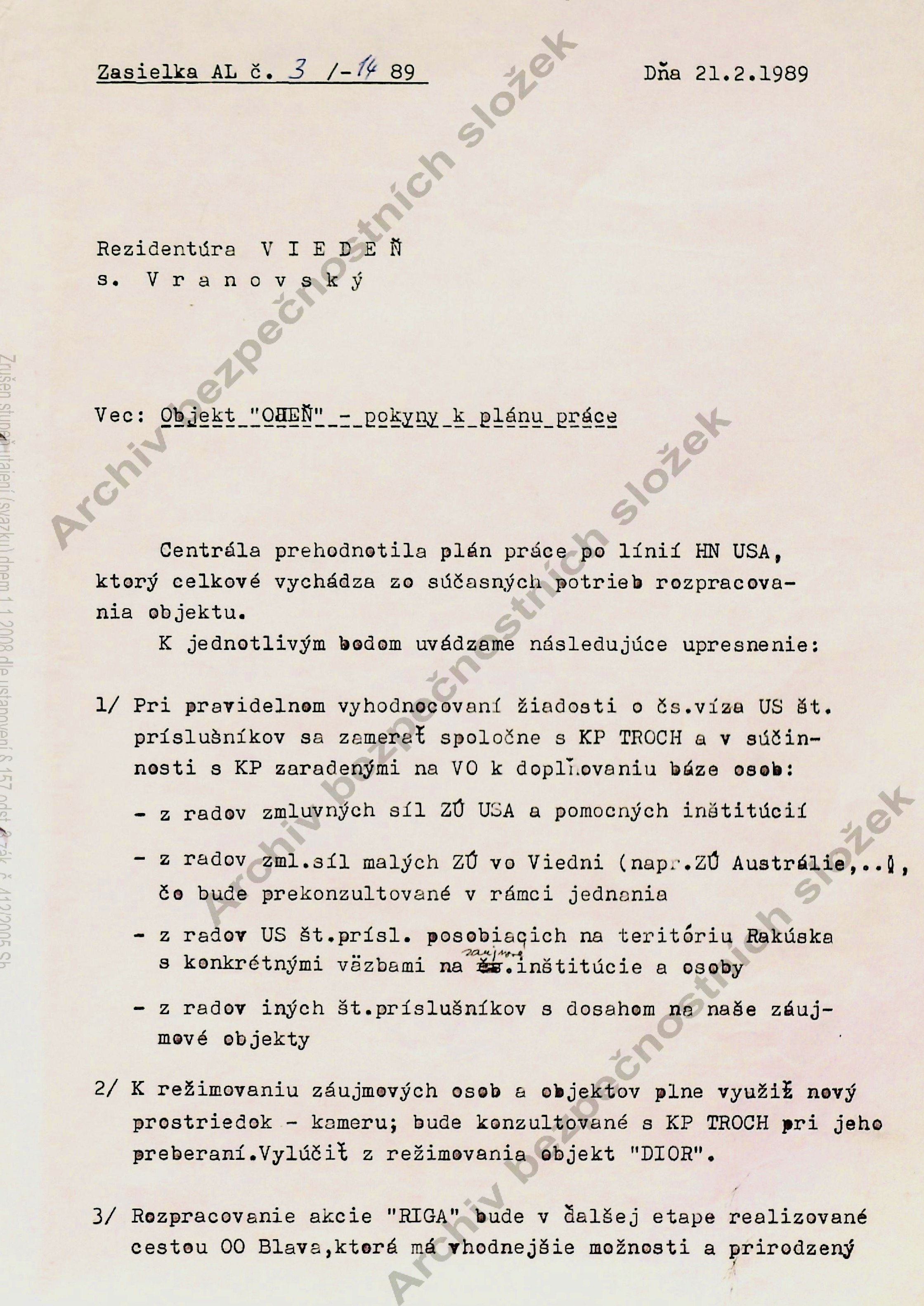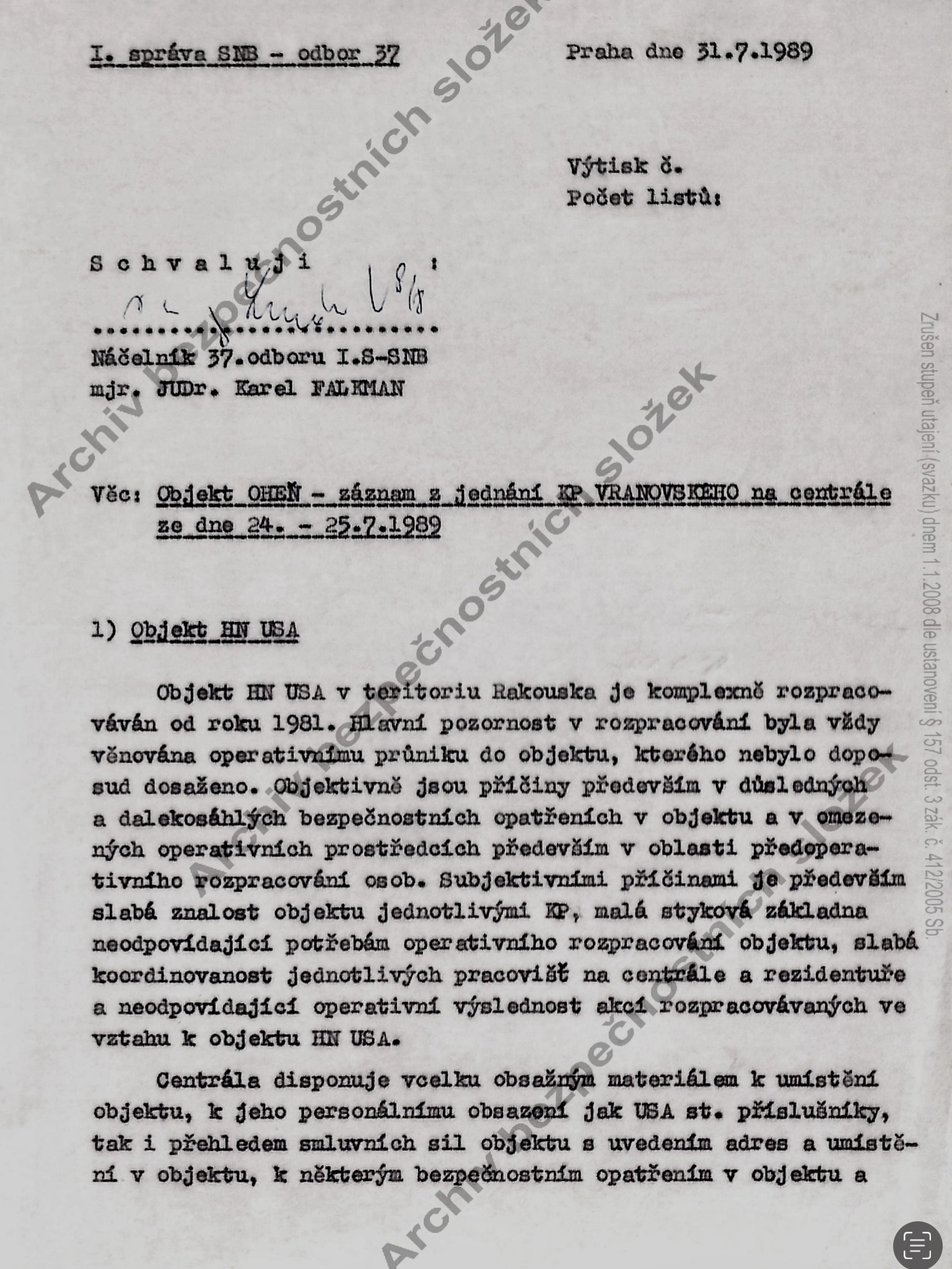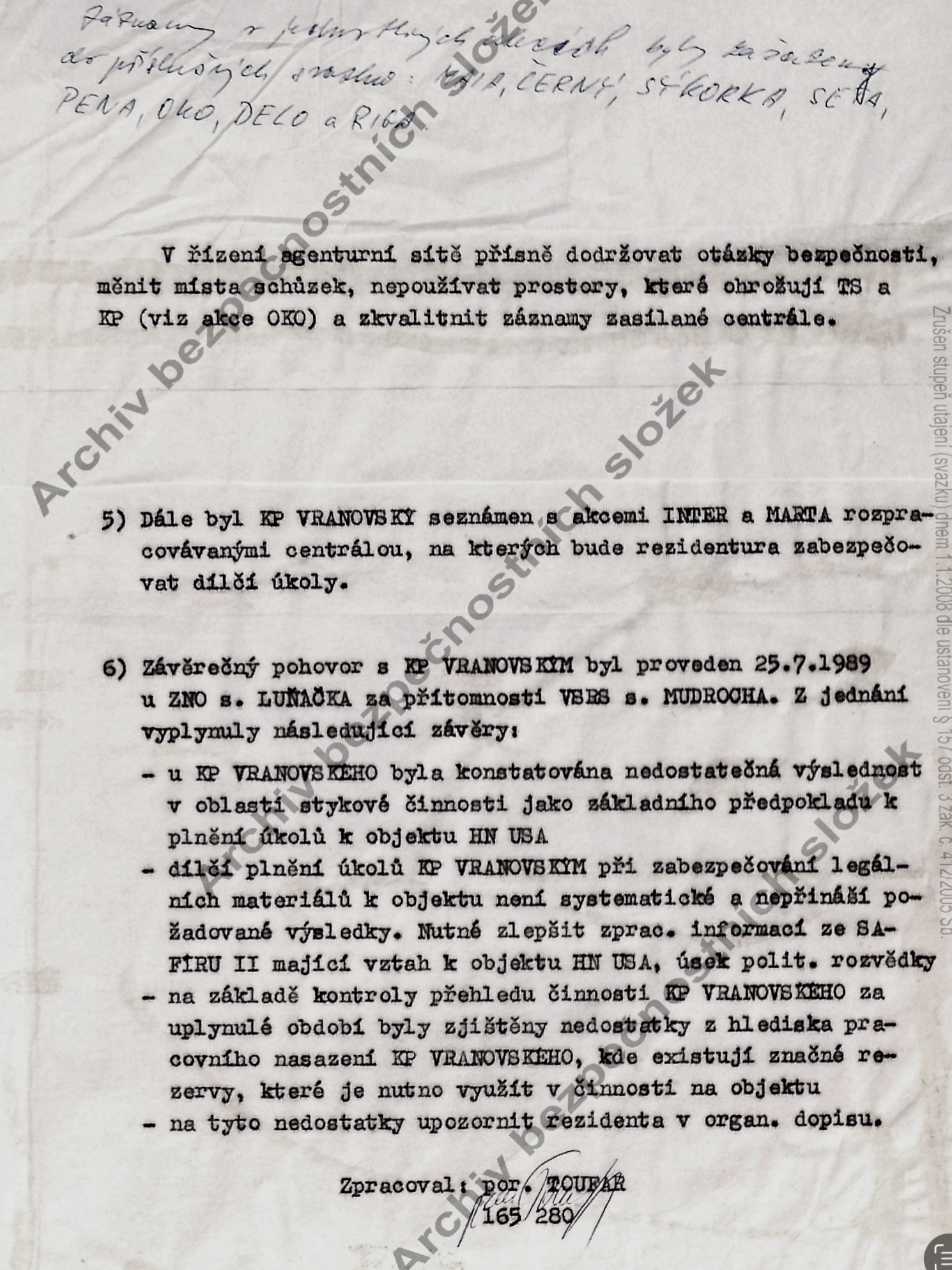Sometime in the summer of 1988, I inexplicably popped up on the StB’s radar screen for the first time as a person of interest. There’s no indication how my name ever came to their attention. Most probably my Czech translator and fixer, Arnold, who himself operated as a secret collaborator for the intelligence services, suggested it (perhaps as a way to further his own career). I’ll likely never know.
Whatever the back story, it’s apparent that by the summer of 1988, just as I was preparing to start a month-long Czech-language course in Brno (see map plot, below), I was already in the StB's cross-hairs for possible collaboration. One of the earliest documents in my file (see photo), from August 1988, is a request from the chief of Section 37 in Prague, identified as Dr. Karel FALKMAN, to the intelligence service’s branch in Brno to keep an eye on me during the course and to question the program’s organizers about anything they might find out about me. The document is labelled “TOP SECRET.” Interestingly, I am still identified here by my real name and not yet INTER, the code name the StB would give to me.
There’s frustratingly nothing else of substance in the file from that language course and no follow-up report. My own memories of the program are much less exciting than what the StB was probably hoping to find. I recall a relaxing month of learning the Czech language’s vexing case structures as well as the words to Moravian folk songs – which seemed to be the program’s main objective. I made friends with the other students but did little outside the classroom aside from drink beer and take long walks around the city. I’ve written previously here about my impressions of the course and of how isolated I felt that month.
Psychological Evaluation
In addition to keeping an eye on me in Brno, the StB was also building a psychological profile of me. Presumably, they were looking for qualities or flaws they could use toward their own ends. The documents are vague as to the sources of their evaluations but indicate that at least some of the information came from hidden photography and surveillance (“APARÁT” in the jargon of the file) during my reporting trips to Prague and Bratislava. These profiles began to appear in my file in early-1989, just after I’d finished two research trips to Prague (in February and March 1989). Not long after this, my code name, INTER, starts to show up in the materials, meaning I’d likely been elevated from a person of interest to a more-formal recruitment target (from an "RS" to an "RT" in the StB's jargon).
More than thirty years after the fact, reading this psychological evaluation of a much-younger, less-self-assured version of me, still raw and in my 20s, is one of the more chilling and embarrassing aspects of the entire file. Here's a taste from the evaluation (I’ve reworded the text slightly for clarity):
“In his emotions, INTER is self-restrained. One sees this in his relationships to unfamiliar persons. At first, he is more reserved and less open during contact. Because of this, his relationships tend to be based more on work than friendship. He cares a lot about his appearance, with which he is probably not satisfied. However, this trait can be profitably used by future contacts with INTER by complimenting him on his manners, his appearance and his prospects for a successful life. A significant character trait is his effort to play the role of a successful, important man, with substantial financial, material and social opportunities. This trait is related to his increased interest in attractive girls. Keeping in mind his reserved personality, he tends to seek out emotionally rich, gentle women who should be attractive and presentable in society.”
An extract from a separate assessment is even blunter and more personal: “During his stays, INTER always showed a great interest in girls, but he did not get many. It is obvious that a matter of sex will be a weak side of INTER’s psyche.”
I admit I chuckled when I read that "did not get many" part. It was obvious from the assessments, whether or not they were accurate, the StB had a sense of humor and had tagged me as insecure and susceptible to flattery. I honestly don’t remember myself in exactly this same way. Indeed, I always took precautions during my reporting trips to avoid any ambiguous or compromising situations.
What's especially strange, in retrospect, is that there's very little in the evaluations about my personal politics or beliefs -- or why in their opinion I might have considered the possibility of working with them. Like many young people at the time, I was turned off by the hawkish rhetoric of the Reagan administration. This was a far cry, though, from supporting the nightmarish regimes of the Eastern bloc. I was fascinated by these countries, but I was horrified by them as well. Most likely, the StB didn't care. They believed they had detected qualities in me they could exploit, and that's what they decided to do.
April/May 1989
The April/May 1989 time-frame appears to a major turning point in the StB's efforts to recruit me. In addition to the psychological profile, the Czechoslovaks sent a special request (see photo) to their colleagues at the Committee for State Security (VStB) in the Soviet Union to ask whether the “American press agency” Business International (BI) was working with the special services of the U.S. In other words, they wanted to know if BI was a front for American intelligence. There was nothing in the file to indicate they ever got an answer, but certainly the last thing they wanted to do was to recruit someone working for the other side. (For the record, our BI Vienna office was not a front for the CIA. Not that it matters, but I could have saved the StB the trouble of making embarrassing inquiries to their Soviet counterparts if they'd only asked.)
On May 17, 1989, a formal, three-page “memorandum” was created and added to my file (see photos). The memorandum included the usual personal details, such as date of birth, nationality, marital status, current and permanent addresses, as well as my code name, “INTER,” and the auspicious word “Agent.” This last part confirmed they were hoping to bring me on board as one of their own. The memorandum included the psychological profile and is filled with interesting background information on me that helped me, finally, to figure out why I was targeted in the first place.
Extrapolating from the text, this was the plan: As an American journalist living in Vienna and rising up the career ladder, I could potentially help the Czechoslovak secret police accomplish their main espionage objective in Austria: to infiltrate the U.S. Embassy. These paragraphs are taken directly from the memorandum (reworded slightly for clarity):
“INTER is satisfied with his job and was recently promoted to the position of editor-in-chief of Business International’s book series, "Doing Business in Eastern Europe." He received a raise in salary. His further success depends on mastering Czech language and establishing broader relations within the ČSSR. In case he accepts our offer of cooperation, we can use INTER in our operations against the "main enemy" (HN), the United States. He has direct opportunities in Vienna to collect information as a journalist and indirect opportunities to infiltrate the U.S. Embassy there. These opportunities will be further broadened and specified by training ...
INTER’s behavior in the ČSSR does not indicate that he cooperates with any foreign intelligence service. He pays no attention to his surroundings, and no signs of personal control were discovered while surveilling him in Bratislava and Prague. His behavior corresponds to his work position. We will add further information regarding INTER after we make contact with him and if he accepts our proposition for collaboration.”
When I read that last sentence … “if he accepts our proposition for collaboration” … a shiver ran down my spine. But at least I now knew the game. They wanted me to spy for them in Austria.
More on 'Operation OHEŇ'
Once I realized their goal, the presence of all those seemingly unrelated materials in my file, the ones concerning a covert Czechoslovak espionage scheme dubbed "Operation OHEŇ,” began to make sense. As I wrote earlier, OHEŇ was a top-secret Czechoslovak plan in the 1980s to infiltrate U.S. organizations, including American embassies, around Europe. Vienna, with its large U.S. Embassy presence as well as being the host city of several UN organizations, international groups like OPEC, and multinational companies, was at the top of the target list of cities.
As I read through dozens of secret documents on Operation OHEŇ' in Austria, it became obvious that by 1988 and early-1989 -- around the time the StB had stepped up its efforts to recruit me – OHEŇ was in trouble. The Czechoslovaks had designated the U.S. Embassy in Vienna as an infiltration target as early as 1981, but an evaluation of the operation from early-1989 (and included in my own file) indicated that the embassy, in fact, had not been breached.
The report assigned blame for this failure, at least in part, to mistakes by the StB resident in Vienna, an individual identified as "KP VRANOVSKÝ." VRANOVSKÝ appeared to be under pressure to right the ship.
In order to demonstrate he was on the case, in January 1989, VRANOVSKÝ outlined a multi-pronged plan to step up the recruitment of individuals who might have valuable contacts to the U.S. Embassy and other American organizations. The report (see photos) identified, first of all, utilizing local contractors employed by the U.S. Embassy as a way of gaining access. The plan also called for greater efforts to recruit friends of embassy personnel, students and “foreign journalists.” My work obviously placed me in that latter group.
My name, INTER, doesn't yet appear in the January 1989 documents on OHEŇ as it was presumably still early in my own vetting and recruitment process. I was likely just one of several individuals whom the StB was considering to help kick-start OHEŇ -- and VRANOVSKÝ appeared to have bigger problems on his plate.
To the best of my knowledge, my code name only first popped up in relation to OHEŇ in July 1989 in a document that detailed a high-level meeting in Prague between VRANOVSKÝ and his bosses on the challenges facing Operation OHEŇ. A line from page five of the document (see photo) states: "VRANOVSKÝ was introduced to the "INTER" and "MARTA" operations that were being developed by headquarters, for which the resident will provide tasks for the participants." I don't know who or what "Operation MARTA" was -- but I can imagine she may also have been an unwitting foreigner like me.
I began this post wondering how it was my name ever got mixed up this stuff in the first place. Reading through the background materials on Operation OHEŇ helped me to understand the "why" part. OHEŇ was failing and officials within the Czechoslovak secret police were casting their nets far and wide for possible new informants.
(In Part 4, I pick up the story in mid-1989 and include details of the extraordinary, day-long StB operation to monitor my activities. Click here to go directly to Part 4.)
